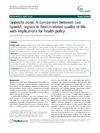Identificador persistente para citar o vincular este elemento:
https://accedacris.ulpgc.es/jspui/handle/10553/48468
| Campo DC | Valor | idioma |
|---|---|---|
| dc.contributor.author | Oliva-Moreno, Juan | en_US |
| dc.contributor.author | Zozaya, Néboa | en_US |
| dc.contributor.author | González Lopez-Valcarcel, Beatriz | en_US |
| dc.contributor.other | Oliva-Moreno, Juan | - |
| dc.contributor.other | Valcarcel, Bea | - |
| dc.date.accessioned | 2018-11-23T22:04:20Z | - |
| dc.date.available | 2018-11-23T22:04:20Z | - |
| dc.date.issued | 2010 | en_US |
| dc.identifier.issn | 1471-2458 | en_US |
| dc.identifier.uri | https://accedacris.ulpgc.es/handle/10553/48468 | - |
| dc.description.abstract | Background. Although health is one of the main determinants of the welfare of societies, few studies have evaluated health related quality of life in representative samples of the population of a region or a country. Our aim is to describe the health-related quality of life of the inhabitants of two quite different Spanish regions (Canary Islands and Catalonia) and to compare the prevalence of health problems between age-sex groups. Methods. We use data obtained from the 2006 Health Survey of Catalonia and the 2004 Canary Islands Health Survey. With an ordinal composite variable measuring HRQOL we identify the association of characteristics of individuals with self-reported quality of life and test for differences between the regions. Results. The prevalence of problems in the five EQ-5 D dimensions increases with age and is generally higher for women than for men. The dimension with the highest prevalence of problems is "anxiety/depression", and there is noteworthy the extent of discomfort and pain among Canary Island women. Education, especially among the elderly, has an important effect on health-related quality of life. Conclusions. There are substantial structural and compositional differences between the two regions. Regional context is a significant factor, independent of the compositional differences, and the effects of context are manifest above all in women. The findings show the importance of disease prevention and the need for improving the educational level of the population in order to reduce health inequalities. | en_US |
| dc.language | eng | en_US |
| dc.relation.ispartof | BMC Public Health | en_US |
| dc.source | BMC Public Health,v. 10 (576) | en_US |
| dc.subject | 531207 Sanidad | en_US |
| dc.subject.other | Sistema sanitario español | en_US |
| dc.subject.other | Calidad de vida | en_US |
| dc.title | Opposite poles: a comparison between two Spanish regions in health-related quality of life, with implications for health policy | en_US |
| dc.type | info:eu-repo/semantics/Article | en_US |
| dc.type | Article | en_US |
| dc.identifier.doi | 10.1186/1471-2458-10-576 | |
| dc.identifier.scopus | 77956919286 | - |
| dc.identifier.isi | 000282893600001 | - |
| dcterms.isPartOf | Bmc Public Health | |
| dcterms.source | Bmc Public Health[ISSN 1471-2458],v. 10 | |
| dc.contributor.authorscopusid | 55361951500 | - |
| dc.contributor.authorscopusid | 9842960600 | - |
| dc.contributor.authorscopusid | 6507677112 | - |
| dc.identifier.issue | 576 | - |
| dc.relation.volume | 10 | - |
| dc.investigacion | Ciencias Sociales y Jurídicas | en_US |
| dc.type2 | Artículo | en_US |
| dc.identifier.wos | WOS:000282893600001 | - |
| dc.contributor.daisngid | 606112 | - |
| dc.contributor.daisngid | 7098471 | - |
| dc.contributor.daisngid | 1229412 | - |
| dc.identifier.investigatorRID | A-1299-2011 | - |
| dc.identifier.investigatorRID | A-9891-2010 | - |
| dc.utils.revision | Sí | en_US |
| dc.date.coverdate | Septiembre 2010 | |
| dc.identifier.ulpgc | Sí | es |
| dc.description.jcr | 2,364 | |
| dc.description.jcrq | Q2 | |
| dc.description.scie | SCIE | |
| item.grantfulltext | open | - |
| item.fulltext | Con texto completo | - |
| crisitem.author.dept | GIR Economía de la salud y políticas públicas | - |
| crisitem.author.dept | Departamento de Métodos Cuantitativos en Economía y Gestión | - |
| crisitem.author.orcid | 0000-0002-5571-3257 | - |
| crisitem.author.parentorg | Departamento de Métodos Cuantitativos en Economía y Gestión | - |
| crisitem.author.fullName | González Lopez-Valcarcel, Beatriz | - |
| Colección: | Artículos | |
Citas SCOPUSTM
14
actualizado el 08-jun-2025
Citas de WEB OF SCIENCETM
Citations
14
actualizado el 22-feb-2026
Visitas
232
actualizado el 15-ene-2026
Descargas
136
actualizado el 15-ene-2026
Google ScholarTM
Verifica
Altmetric
Comparte
Exporta metadatos
Los elementos en ULPGC accedaCRIS están protegidos por derechos de autor con todos los derechos reservados, a menos que se indique lo contrario.
